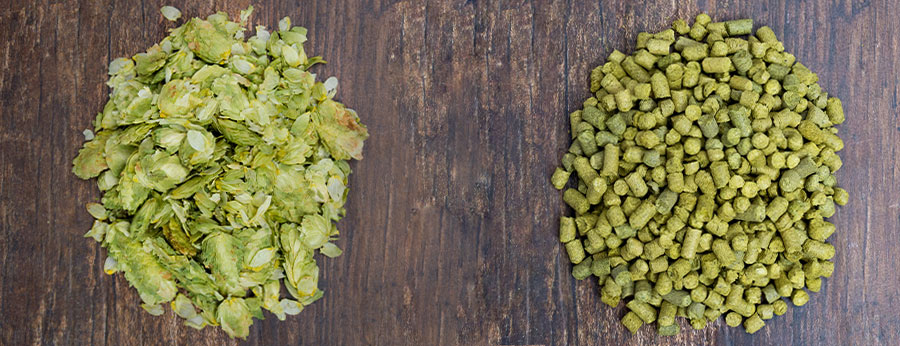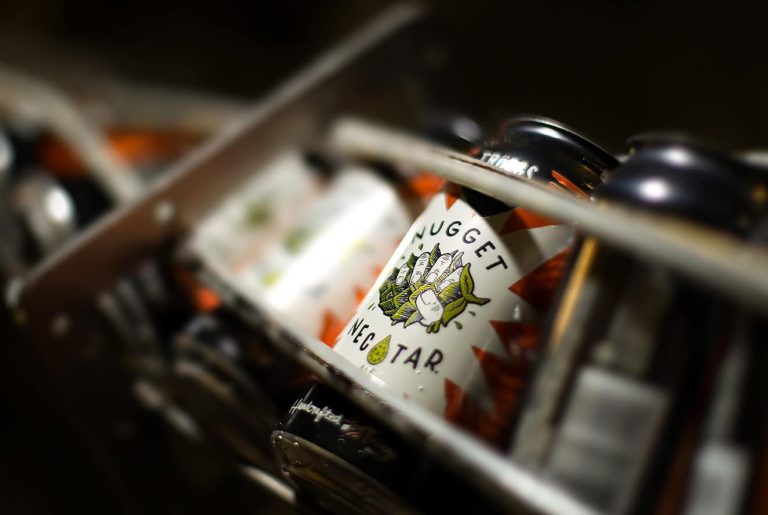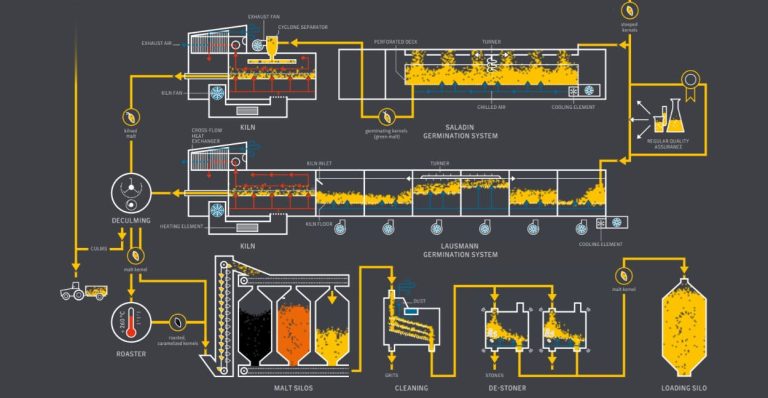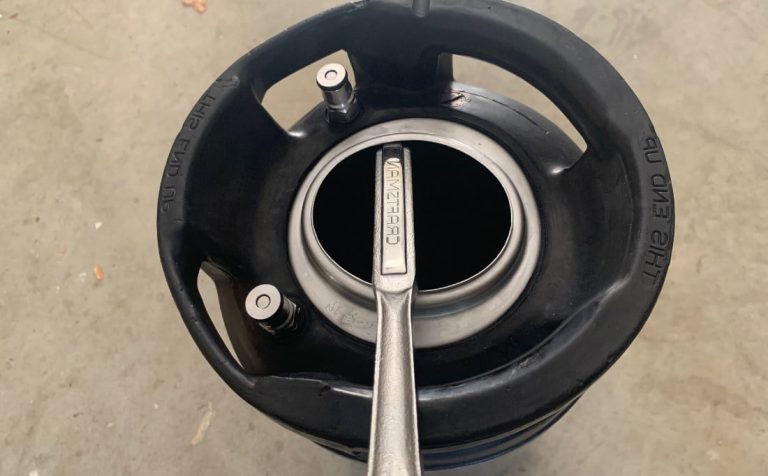What’s the Difference? Fresh, Whole, Pellet, Hash, Lupulin and Extract Hops Compared
Hops are used to provide stability, bitterness, flavor and aroma in beer. They come in a variety of options that range from fresh off the bine to a syrupy extract. I’ve always had questions surrounding which was better and the pros-and-cons of each type, so I decided to dig in.
The History of Hops
The hop plant is a vigorously climbing perennial plant that has “bines” in place of the typical “vines” we find on other climbing plants. It is usually trained to grow up strings or trellises when grown commercially on farms called hopyards. Hop production is concentrated in moist temperate climates – Washington State in the US – for the best yield, but can still be found all over the world as either wild, smaller bespoke farms.
Hops were first used as an ingredient in beer back in the 9th century, but they didn’t become a primary source of bitterness, stabilization and flavor until a couple of hundred years later in Germany.
Hops provide an antibacterial effect in beer by preventing less desirable microorganisms from growing and spoiling the beer. Hops also balance the sweetness of the malt with bitterness and a variety of flavors and aromas. Before hops were used extensively in brewing beer, traditional herb combinations were used including dandelions and “gruit“. These herbs and other vegetation were quickly abandoned in favor of hops when it was noticed that beer brewed with hops was much less prone to spoilage.
Hop Pellets
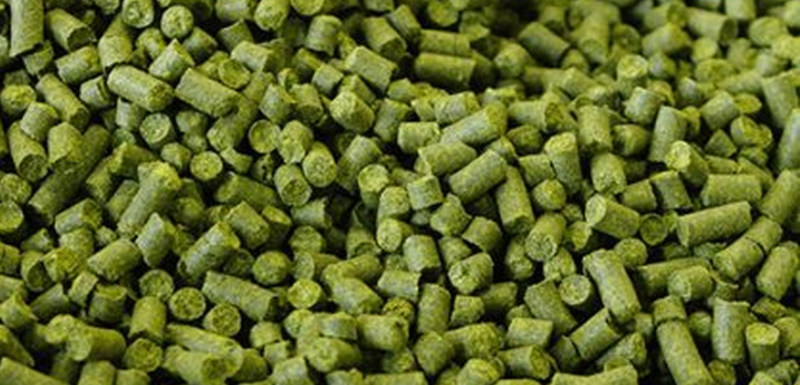
The most common and widely used version of hops in homebrewing is the T-90 hop pellet. Hop pellets are simply whole cone hops that have undergone a special pelletization process by the manufacturer. The whole hops are stripped from the bines during harvest, processed, and then pushed through special compression tubes that force the hop matter into firm, kiln-dried pellets.
This pellet processing preserves the hop flavor and aroma best for long term storage, which means it is overwhelmingly the preferred vehicle for using hops in homebrewing.
Pros of Hop Pellets:
- Hop pellets are much more accessible to homebrewers.
- Hop pellets oxidize slower, thus has better storage potential.
- Hop pellets take up less space and are easily stored in the freezer.
- Pellet hops are easier to split into smaller increments used in 5-gallon (or less) batches.
- Hop pellets have a slightly higher utilization efficiency (10-15%)
Cons of Hop Pellets:
- Hop pellets tend to dissolve into a porridge consistency when placed in a liquid solution, which can cause blocked siphons, keg posts or other tools if not contained in a bag or hop spider.
- Some delicate aromatic compounds are lost during the pelletization process.
Whole Hops
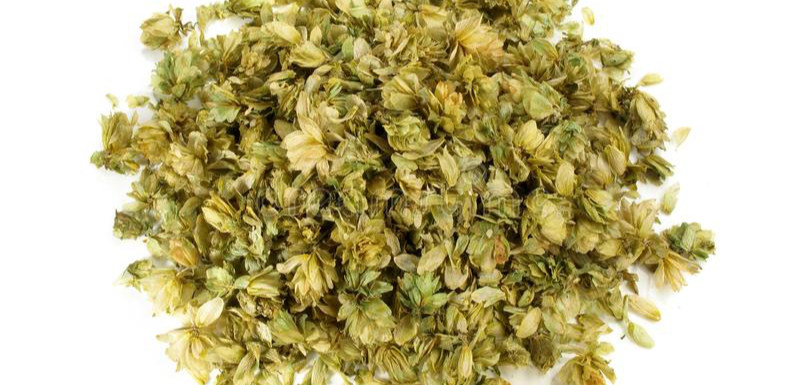
Whole cone hops are simply the harvested, kiln dried, and unprocessed form of the hop flower. Whole hops are usually preferred by some large commercial breweries as a point of pride, but there are strikingly few benefits to using whole hops.
Pros of Whole Hops:
- Whole cone hops retain more of their essential oils due to the fact they haven’t been processed resulting in a greater aroma and flavor impact in the final beer.
- Whole cone hops are usually easier to remove from your wort during the boil or finished beer after dry-hopping.
Cons of Whole Hops:
- Whole cone hops are typically between 40-50% more expensive than pellet hops.
- Whole cone hops take up significantly more storage space than pellets. The increased space needed to store these types of hops are even more difficult for homebrewers due to the fact that most hops need to be stored in the freezer to preserve them.
- Whole cone hops are harder to get to the exact ounce or gram proportions when brewing the smaller homebrew batches.
- Larger breweries need special equipment to properly manage the use of whole cone hops.
Fresh “Wet” Hops

Fresh hops are mostly only accessible to homebrewers if they grow their own hop plants or live in the Pacific Northwest. Also referred to as “wet” hops, these hop cones are unkilned, and used right after they are picked off the bines in the fall.
Pros of Fresh/Wet Hops:
- Homegrown wet hops can be a free source of hops when brewing, thus reducing the price of each batch made even further.
- The use of an ingredient that is unprocessed will result in using 100% of the aromatics and oils within that hop.
- Wet hops provide a slightly different and “fresher” flavor to beer.
Cons of Fresh/Wet Hops:
- Since hops can have different brewing values (alpha/beta acids, oil amounts, etc), it can be very difficult to know the exact values, thus making it hard to use the correct amounts when brewing.
- Home-grown hops almost never have the same flavor and aroma of hops that are commercially grown in the areas of the country that are conducive to optimal flavors. This means that more wet hops are needed to produce the same flavor and aroma as dried versions.
- Sanitizing wet hops can be difficult. This is not too much of a problem when used in a boil, but presents major problems when being used cold-side such as in dry-hopping.
- Hops mature in the fall, so even if you grow your own hops, you can only use them as truly “wet” hops at that time of the year.
- Hop plants can become an invasive species very easily. Hop plants spread their root systems quite extensively to create more hop plants, resulting in an uncontrollable mess if you don’t stay on top of them annually.
Lupulin Powder
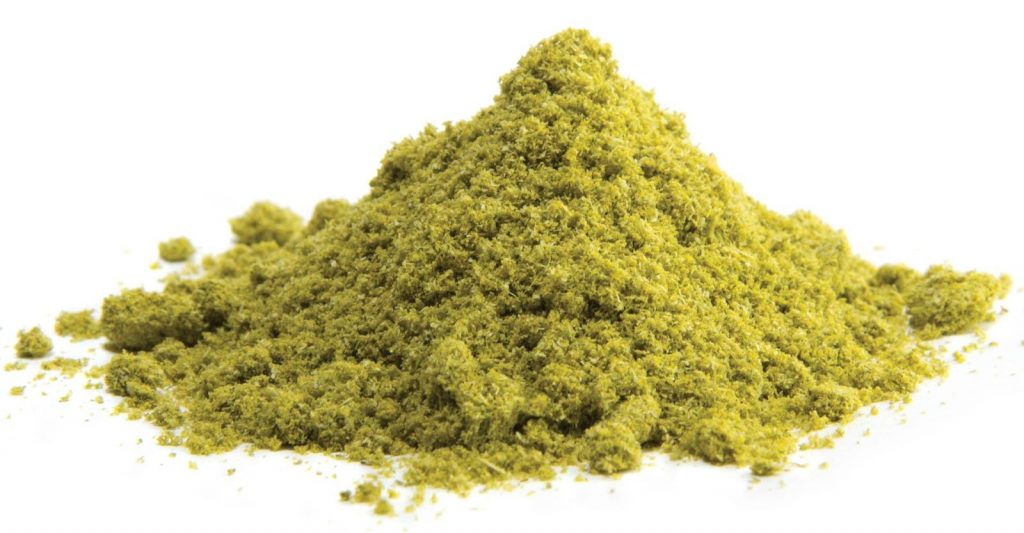
Lupulin (pronounced loop-you-lin) is the yellow gland of a hop plant in which the hop acids and the essential oils can be found. Lupulin is a fine yellow powder that can be separated out from the green leaves of the hop itself, sort of like pollen from a flower. The hops that you can purchase that are labeled either as “Lupulin”, “Cryo” or “Lupomax” are still a processed version of the hop cone, but in a way that preserves substantially more oil and resin content leading to increased flavor and aroma. The result is a product with around twice the potency of T90 pellets, with reduced astringency and vegetative material.
Lupulin “hops” often come pelletized, but they are comprised of the lupulin powder compressed into pellet form.
Must Read: The Case to use Cryo Hops (Lupulin Powder) in Every IPA
Pros of Lupulin Hop Powder:
- Increased flavor and oil contents mean that about 50% less hops need to be used.
- Because it is a powder and because only about half the typical amount is needed, there will be less hop matter resulting in less wort or trub loss.
- Lupulin hops are still in pelletized form, meaning they are just as easy to store as normal T90 pellets.
Cons of Lupulin Hop Powder:
- These hops are much more expensive than normal hop pellets. While you need to use less of lupulin hops due to their increased oils, the cost is still about double.
- Harder to find at local homebrew stores.
Hop Hash
Hop hash is simply a byproduct of the pelletizing process. It is the collected dust that settles on the machines as hops were being pulverized and turned into pellets. In this sense, it is essentially just another form of powder, very similar to Lupulin powder.
Hop Extract

Hop extract is pure resin extract containing alpha acids, beta acids, and hop oils from the hop cone. Hop extract is produced using a CO2 process which extracts the soft resins and essential oils that exist within hops. This means that hop extract has no vegetal matter, and is 100% oils. Hop extract is commonly sold in cans, syringes or eye dropper bottles.
Pros of Hop Extract:
- Only one milliliter of extract yields approximately 10 IBUs in 5 gallons of wort when boiled for 60 minutes.
- The bitterness imparted by hop extract is considered less aggressive on the palate due to the absence of vegetal matter.
Cons of Hop Extract:
- Less hop varieties are sold in extract form.
- Most recipes do not account for hop extract usage, so adjustments will need to be made to common recipes found online.
- Does not add much hop flavor or aromas and is typically only used for bittering.
- Leaves a film or residue on the boil kettle that is harder to clean.
Conclusion
I think I am going to stick with the boring old hop pellets for now unless I can find Lupulin powder pellets on sale. If I can find the powder on sale, it will be a no-brainer to use that for any of the late boil or dry-hop additions to my IPA batches.
